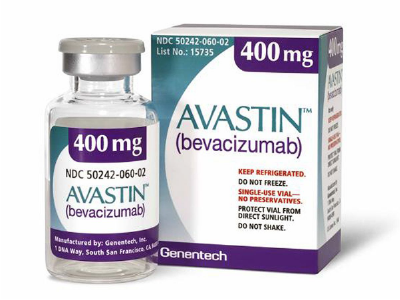
The first medication that targeted VEGF was the monoclonal antibody, bevacizumab. Bevacizumab binds to VEGF and prevents its interaction with VEGF receptors on the surface of endothelial cells. In animal models, this results in a reduction of microvascular growth and an inhibition of metastatic disease progression. Early studies showed that monotherapy with bevacizumab induces only a minimal response. However, when used in combination with chemotherapy, bevacizumab "normalizes" tumor blood vessel architecture and enhances the delivery of chemotherapeutic drugs into the tumor tissue.
Bevacizumab has indications for the treatment of metastatic colorectal cancer, non-squamous non-small cell lung cancer, glioblastoma, metastatic renal cell carcinoma, cervical cancer, and ovarian, fallopian tube, and primary peritoneal cancer. In patients with mCRC, it is indicated for the first- and second-line treatment of patients with mCRC in combination with intravenous 5-FU-based chemotherapy. In addition, in patients who have progressed on a first-line bevacizumab-containing regimen, it is indicated for the second-line treatment of mCRC in combination with a fluoropyrimidine-irinotecan regimen or a fluoropyrimidine-oxaliplatin regimen. It is not indicated for the adjuvant treatment of colon cancer.
The bevacizumab prescribing information has boxed warnings related to the potential for gastrointestinal perforations, surgery and wound healing complications, and hemorrhage. In clinical trials, the incidence of gastrointestinal perforations, some of which were fatal, ranged from 0.3 to 3% in bevacizumab-treated patients. Bevacizumab should be discontinued in patients with gastrointestinal perforation.
